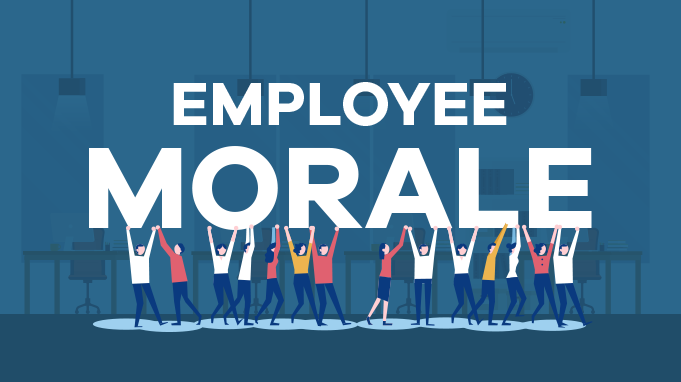Employee morale is key to the success of any organization. When employees are happy and feel appreciated, they are more productive and efficient. However, when employee morale is low, it can be difficult for the company to achieve its goals. In this blog post, we will discuss what employee morale is, why it is critical for organizations, and ways to boost employee morale. We will also explore how Mantra Care EAP can help organizations improve employee morale.
Defining Employee Morale

Employee morale can be defined as the overall attitude and outlook of employees towards their job, workplace, and company. Employee morale is critical for organizations because it can have a direct impact on productivity and profitability.
- When morale is high, employees are more likely to derive satisfaction with their work and feel proud to be a part of the organization. As a result, they are also more likely to be productive and efficient in their roles and driven to achieve organizational goals. Incidentally, this leads to increased productivity and efficiency, which can ultimately improve the bottom line.
- In contrast, when morale is low, employees may have dissatisfaction with their work, feel unappreciated or undervalued, and lack motivation. Further, this low morale can lead to decreased productivity and efficiency, as well as increased absenteeism and turnover. Consequently, this can lead to decreased profitability and, in extreme cases, organizational failure.
What Can Cause Blow To It

Several factors can cause employee morale to decline. Some of the most common include:
- a lack of appreciation,
- unrealistic expectations,
- poor communication, and
- a lack of opportunity for career growth.
Additionally, employees may become demotivated if they feel that their work is not meaningful or valuable.
Signs of Low Employee Morale

Several signs can indicate low employee morale. Some of the most common include:
- increased absenteeism,
- decreased productivity,
- increased turnover, and
- more employee complaints.
Additionally, employees may express dissatisfaction with their work, feel unappreciated, or lack motivation. If you notice any of these signs in your workplace, it is important to take action to improve morale.
Boosting Employee Morale

It is also important to create a positive company culture that values employee morale. Company culture encompasses the values, beliefs, and behaviors that are shared by the organization’s members. Creating a positive company culture can help to improve employee morale by making employees feel valued and appreciated.
Create a Positive Company Culture

There are several ways to create positive company culture. However, some of the most effective include:
- Showing appreciation: Employees need fuel on appreciation as it acts as a dose of motivation. Make sure to thank your employees for their hard work and let them know that you value their contributions.
- Communicating effectively: Poor communication can be a major source of low morale. Make sure to keep your employees updated on company news and developments, and take the time to listen to their concerns.
- Providing opportunities for career growth: Employees want to feel that they are progressing in their careers. Offer opportunities for employees to develop their skills and knowledge, and provide paths for advancement within the organization.
- Creating a positive work environment: The physical environment can have a big impact on employee morale. Make sure your workplace is clean, comfortable, and conducive to productivity.
Encourage Employee Engagement

Employee engagement refers to the level of employees’ commitment and connection to their work and the organization. Thus, employees who are engaged are more likely to be productive and satisfied with their jobs. Incidentally, there are several ways to encourage employee engagement, such as:

- Providing opportunities for autonomy: Allow employees to have some control over their work and how they complete tasks.
- Encouraging collaboration: Create opportunities for employees to work together on projects.
- Giving employees a voice: Make sure employees feel that their opinions bear some value and that they have a say in decision-making.
- Fostering a sense of belonging: Help employees feel like they are part of a community by promoting social activities and encouraging team building.
- Supporting employees’ health and well-being: Help employees maintain a healthy work-life balance by providing support for their physical and mental health.
Introduce Regular Feedback And Appraisals

It is also important to provide employees with feedback and appraisals.
- Feedback helps employees to understand how they are performing in their roles and what areas need improvement.
- Appraisals allow employees to receive recognition for their accomplishments and progress.

Giving employees regular feedback is important to ensure that they are on track and meeting expectations. Additionally, appraisals allow employees to reflect on their performance and identify areas for improvement.
PRO TIP: Make sure to give employees both positive and constructive feedback to help them improve their performance.
Give Rewards And Recognition

Rewards and recognition are also important for boosting employee morale.
- Rewards can be given for a variety of accomplishments, such as meeting sales targets, completing training courses, or going above and beyond in their work.
- Recognition can be given in the form of awards, certificates, or even just verbal praise.
Recognizing employees for their accomplishments is a great way to boost morale. However, rewards and recognition can take many forms, such as:

- Verbal praise: A simple “thank you” can go a long way in making an employee feel appreciated.
- Written recognition: Write a positive review on an employee’s performance review or send them a handwritten note.
- Public recognition: Announce an employee’s achievement at a company meeting or in a company newsletter.
- Financial rewards: Give employees bonuses or raises to show their appreciation for their hard work.
PRO TIP: Get creative with your rewards and recognition to make sure they are meaningful to the recipient.
Offer Financial Incentives

Offering financial incentives is another great way to boost employee morale. Since financial incentives can work as powerful rewards for employees for their performance or encourage them to meet specific goals.
Some examples of financial incentives include:
- Raises: Raises can be given to employees who have been with the company for a long period or who have demonstrated outstanding performance.
- Bonuses: Bonuses can be given for a variety of reasons, such as meeting sales targets, completing training courses, or going above and beyond in their work.
- Commission: Commission can be given to employees for outstanding performance or for meeting specific goals, such as those who meet or exceed sales targets.
- Stock options: Stock options give employees an ownership stake in the company and can be used as an incentive to encourage long-term commitment.
- Profit-sharing: Profit-sharing is a great way to encourage employees to work towards the company’s success.
All of these financial incentives help to make employees feel appreciated and valued. Additionally, they can help to improve employee productivity and engagement.
PRO TIP: Make sure to tailor your financial incentives to the individual employees and their goals to ensure they are effective.
Seek Feedback From Employees

Finally, it is important to seek feedback from employees. Since employees are the best source of information when it comes to morale. For starters, you can ask employees how they are feeling and what can be done to improve morale. In addition, encourage employees to be honest and open with their feedback. Additionally, make sure to act on the feedback you receive.
PRO TIP: Make sure to listen to your employees and take their feedback seriously.
A Word From MantraCare Wellness
Employee wellness programs are the key to improving employee motivation, productivity, and retention. At MantraCare Wellness, we have a team of health experts, counselors, and coaches who serve corporate employees with 10+ wellbeing programs including EAP, Employee Diabetes Reversal, Corporate MSK, PCOS, Employee Fitness, Corporate Yoga, Employee meditation, and Employee Smoking Cessation.



